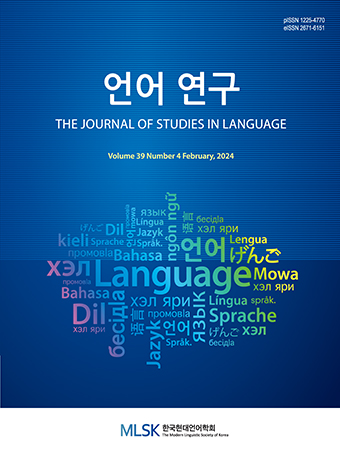Research Article
Abstract
References
Information
Machine Translation (MT) such as Google Translate and Naver Papago has had important roles in L2 learning. In EFL settings, which are classroom-based English learning environments, Machine Translation (MT) has provided both learners and teachers with innovative means to learn English. With these ground-breaking challenges, this research aimed to study high school students’ perceptions and attitudes toward using MT in English writing classes. This study gathered qualitative data using a questionnaire to 173 students at a high school located in Seoul. The survey questions included students’ use of MT and their degree of satisfaction. Also, students’ level of expectations and affective aspects were asked in the questionnaire. Findings show that most students who responded to the survey used MT to search for the meaning of unknown English words and to translate L1 sentences into English ones. While anxiety level caused by L2 learning was reported to be lowered, whether the level of learning interest and accomplishment was increased or not remained uncertain. Based on the pedagogical implication the use of MT in English learning will give unprecedented questions and considerations to teachers and learners of L2 continuously.
- 공태수, 백재파. 2021. 한국어 학습자의 기계번역 활용 실태 연구. 학습자중심교과교육연구, 21.5, 859-871.
- 김혜경, 한수미. 2021. AI 기반 영작문 학습도구에 대한 대학생 학습자 인식: Google Translate, Naver Papago, 그리고 Grammarly를 중심으로. 현대영어교육, 22.4, 90-100. 10.18095/meeso.2021.22.4.90
- 남신혜. 2019. 한국어 학습자의 온라인 기계번역 도구 사용 경험 및 태도에 관한 연구: 초급 및 중급 학습자를 대상으로. 언어와 문화, 15.2, 55-81. 10.18842/klaces.2019.15.2.3
- 이상빈. 2020. 기계번역에 관한 KCI 연구논문 리뷰: 인문학 저널 논문(2011~2020년 초)의 논의내용과 연구방법을 중심으로. 통역과 번역, 22.2, 75-104. 10.20305/it202002075104
- 이윤재, 이동주. 2020. 영어자동번역기 활용이 고등학생 영어 글쓰기에 미치는 영향. 영어교과교육, 19.2, 159-180.
- 이정원. 2022. EFL 학습자의 외국어 불안에 대한 인식과 태도 연구. 현대영어영문학, 66.1, 155-174. 10.17754/MESK.66.1.155
- 이정화, 차경환. 2014. 한국어 구어 문장 파파고 한-영 번역 오류 유형 고찰. 현대영어교육, 23.1, 56-65.
- 임희주. 2017. 교양영어 수업에서 영어자동번역기 사용에 대한 대학생의 인식 및 태도연구. 교양교육연구, 11.6, 727-751.
- 전혜리, 이상민, 박일희. 2021. 영어교육에서의 AI 활용 연구에 대한 체계적 문헌 고찰. 멀티미디어 언어교육, 24.1, 87-103. 10.30806/fs.24.3.201909.87
- 정남숙. 2021. AI 번역기를 활용한 활동이 대학생 영어쓰기 능력과 정의적 태도에 미치는 영향. 멀티미디어 영어교육, 24.1, 134-157. 10.32349/ECERR.2020.2.24.1.209
- 황요한, 이재영, 신동진. 2020. 온라인 기계 번역기의 과거, 현재 그리고 미래: 오류 분석을 중심으로. 언어연구, 36.2, 191-210. 10.31565/korrow.2019..41.007
- Ahn, S. and Chung, E. 2020. Students’ perceptions of the use of online machine translation in L2 writing. Multimedia-Assisted Language Learning 23.2, 10-35.
- Alhaisoni, E. and Alhaysony, M. 2017. An investigation of Saudi EFL university students’ attitudes towards the use of Google Translate. International Journal of English Language Education 5.1, 72-82. 10.5296/ijele.v5i1.10696
- Cancino, M. and Panes, J. 2021. The impact of Google Translate on L2 writing quality measures: Evidence from Chilean EFL high school learners. System 98, 102464. 10.1016/j.system.2021.102464
- Chon, Y. V. and Shin, D. 2020. Direct writing, translated writing, and machine-translated writing: A text level analysis with Coh-Metrix. English Teaching 75.1, 25-48. 10.15858/engtea.75.1.202003.25
- Ducar, C. and Schocket, D. H. 2018. Machine translation and the L2 classroom: Pedagogical solutions for making peace with Google translate. Foreign Language Annals 51, 779-795. 10.1111/flan.12366
- Garcia, I. and Pena, M. 2011. Machine translation-assisted language learning: writing for beginners. Computer Assisted Language Learning 24.5, 471-487. 10.1080/09588221.2011.582687
- Groves, M. and Mundt, K. 2015. Friend or foe? Google Translate in language for academic purposes. English for Specific Purposes 37, 112-121. 10.1016/j.esp.2014.09.001
- Kol, S., Schcolnik, M., and Spector-Cohen, E. 2018. Google Translate in Academic Writing Courses? The EUROCALL Review 26.2, 50-57. 10.4995/eurocall.2018.10140
- Krashen, S. D. 1982. Principles and Practice in Second Language Acquisition. Oxford: Pergamon.
- Lee, S. 2019. The impact of using machine translation on EFL students’ writing. Computer Assisted Language Learning 33.3, 157-175, DOI: 10.1080/09588221.2018.1553186. 10.1080/09588221.2018.1553186
- Lim, H. and Kamei, F. 2019. A Study on the Use of Machine Translation In Korean Language Education. Journal of the International Network for Korean Language and Culture 16.3, 297-315. 10.15652/ink.2019.16.3.29
- Murtisari, E., Widiningrum, R., Branata, J., and Susanto, R. 2019. Google Translate in Language Learning: Indonesian EFL Students’ Attitudes. The Journal of Asia TEFL 16.3, 978e986. 10.18823/asiatefl.2019.16.3.14.978
- Niño, A. 2020. Exploring the use of online machine translation for independent language learning. Research in Learning Technology 28, 2402. 10.25304/rlt.v28.2402
- Organ, A. 2022. Attitudes to the Use of Google Translate for L2 production: Analysis of Chatroom Discussions among UK Secondary School Students. The Language Learning Journal 51.3, 328-343, DOI: 10.1080/09571736.2021.2023896. 10.1080/09571736.2021.2023896
- Tsai, S. 2019. Using google translate in EFL drafts: a preliminary investigation. Computer Assisted Language Learning 32.5-6, 510-526. 10.1080/09588221.2018.1527361
- Publisher :The Modern Linguistic Society of Korea
- Publisher(Ko) :한국현대언어학회
- Journal Title :The Journal of Studies in Language
- Journal Title(Ko) :언어연구
- Volume : 39
- No :1
- Pages :7-21
- DOI :https://doi.org/10.18627/jslg.39.1.202305.7




 The Journal of Studies in Language
The Journal of Studies in Language






